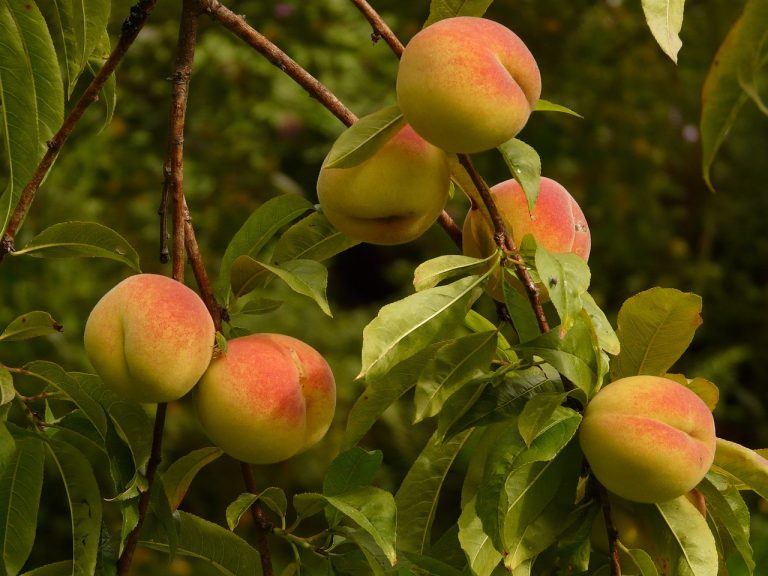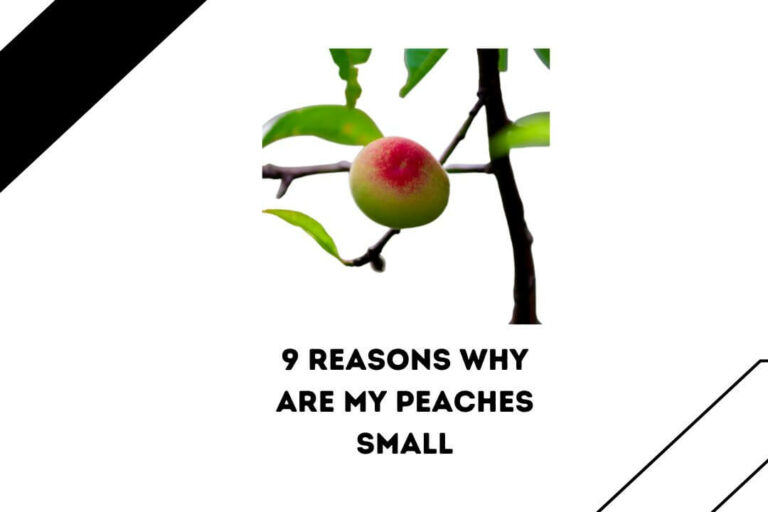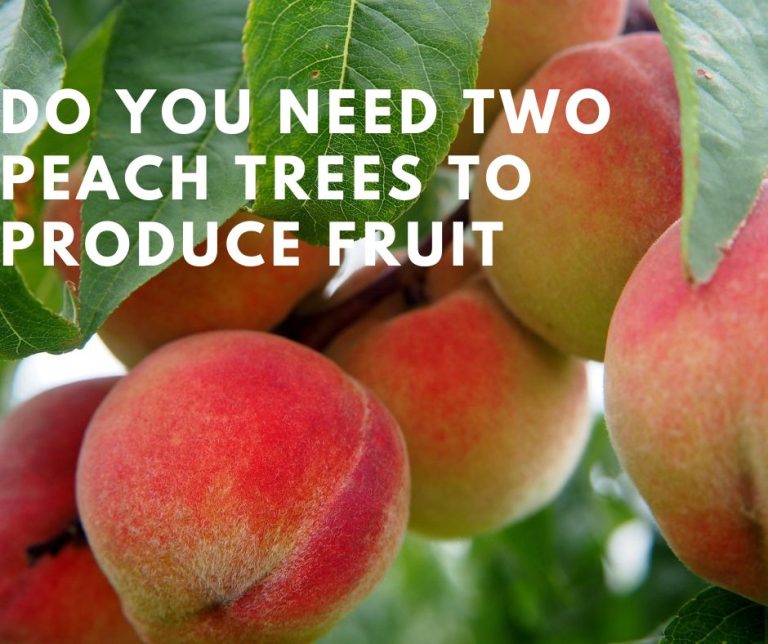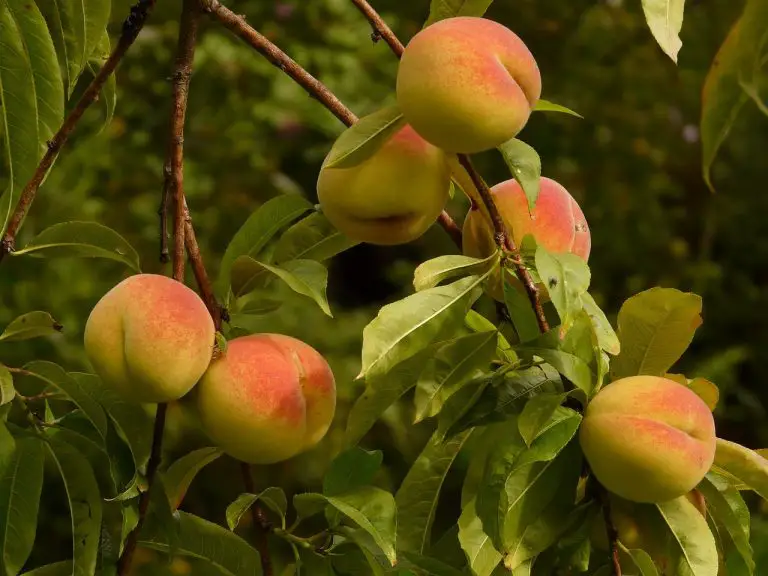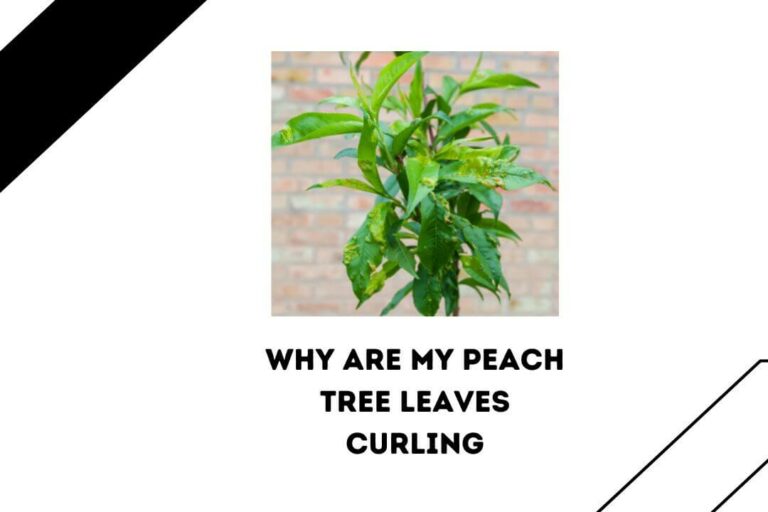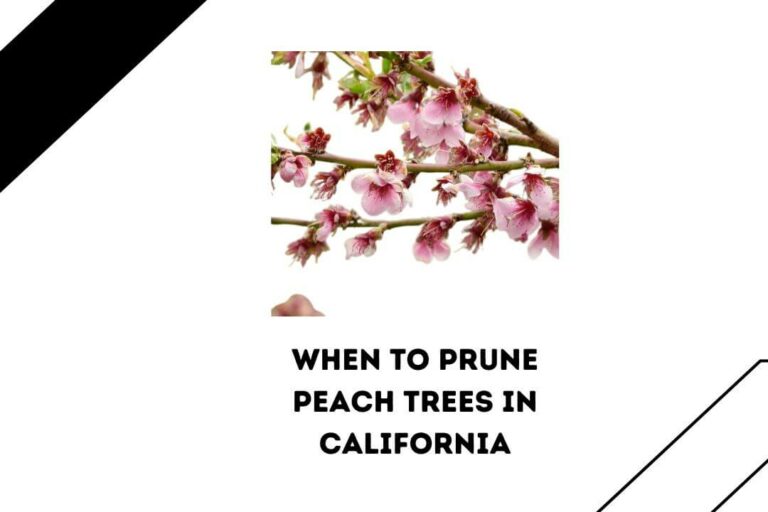Whether you plan to grow peaches, you are not alone in asking, “are peaches self-pollinating.” Even though the answer is a bit more complicated than a simple yes or no, I will try my best to help you explore what it means for a peach tree to be self-pollinating and seven self-pollinating peach trees.
We’ll also discuss some pros and cons of growing self-pollinating peach trees. On many occasions and in the community, people often debate whether peach trees are self-pollinating or require cross-pollination from another tree.
In this article, I will try my best to give you a proper in-depth answer and explanation to the question “do peach trees self-pollinate” along with the must-know knowledge you need to grow flourishing peach trees in your garden.
Are Peach Trees Self-Pollinating?
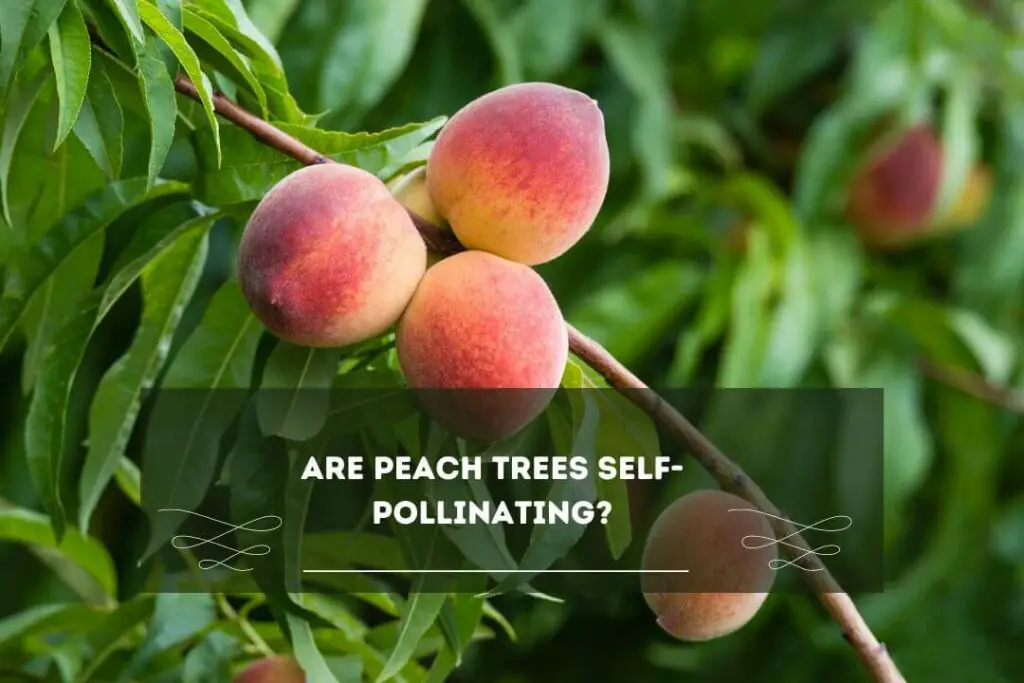
It significantly depends on the variety of peach trees you are growing. Some peach tree varieties are self-pollinating, “like Early Elberta, Red Haven,” while others require cross-pollination from another tree.
I hope you already know that Self-pollinating peach trees usually develop both “male and female reproductive organs,” which help them pollinate themselves without needing another tree’s assistance.
On the other hand, you will find almost cross-pollinating peach trees needing pollen from a different peach tree to fertilize their flowers and produce fruit. Depending upon your region, soil type, and climatic conditions, you should choose the right kind of peach tree for successful harvesting.
Are All Peach Trees Self-Pollinating?
No, not all peach trees are self-pollinating. You will find many peach tree varieties that need cross-pollination from another tree to produce bountiful fruit.
Chances are, you have encountered speech trees that require cross-pollination in significant cases. However, If you have a cross-pollinating peach tree in your garden, you will have to plant another peach tree of a different variety nearby your existing peach tree. Also, choose the peach tree variety that blooms simultaneously to ensure cross-pollination. Also, You must provide proper care and attention to your plant by providing right amount of balance fertilizers as well as natural pesticides. You should know that even self-pollinating peach trees may still fall victim to insects that can eat their fruit. To learn more about which insects could be eating your peaches, click here.
However, if you want to know about self-pollinating peach trees or peach trees that self-pollinate, here are the seven most common and popular varieties.
7 self-pollinating peach tree varieties
- Bonanza Peach Tree: Compared to traditional peach trees, the Bonanza Peach Tree is a dwarf peach tree that produces medium-sized, sweet fruit. Since this tree is self-pollinating and dwarf in size that can grow up to 8 feet tall, the bonanza peace tree is perfect for indoor or outdoor gardening.
- Early Elberta Peach Tree: Another peace tree variety known to be self-pollinating and produce bountiful sweet fruit is the Early Elberta peach tree. This tree can grow up to 20 feet tall compared to the previous one.
- Golden Jubilee Peach Tree: The Golden Jubilee Peach Tree is also a self-pollinating tree known to produce large & yellow fruit with a sweet & tangy flavor.
- Harvester Peach Tree: Another great self-pollinating tree is Harvester Peach Tree, which you can grow anywhere depending on specific conditions and requirements; however, I should tell you that these varieties reproduce medium-sized fruit but with a sweet flavor.
- Red Haven Peach Tree: YES, Red Haven Peach Tree is also self-pollinating. However, these varieties are known for their medium to large-sized fruit with red skin and a sweet flavor. Another thing to note is that these specimen is known to grow up to 15 feet tall.
- Reliance Peach Tree: Another great self-pollinating peach treat that is known to produce bounties fool of Crops as far as north Canada is Reliance Peach Tree. This specimen has medium to large-sized fruit with a sweet flavor. Not only can this tree grow up to 20 feet tall, but it is also suitable for growing under severe winter conditions.
- Suncrest Peach Tree: The Suncrest Peach Tree is also a self-pollinating tree that Is popular for producing large, round, firm-fleshed, freestone fruit.
If you are feeling confused about which species will suit you better, you can consider reading our following articles, where we have compared different species of the peach trees that you can grow indoor as well as outdoor.
- Red Haven vs Reliance Peach
- Elberta vs Red Haven Peach
- Do You Need Two Peach Trees to Produce Fruit?
5 Pros of self-pollinating peach tree
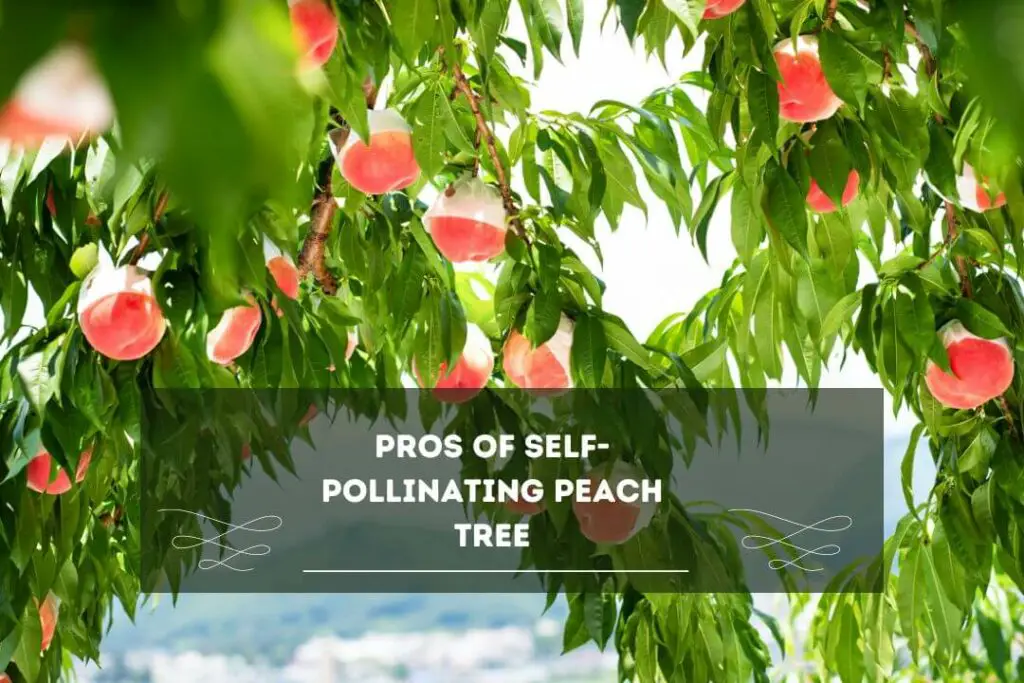
After knowing that Self-pollinating peach trees are an excellent option for those who want to grow peaches without growing multiple trees for cross-pollination, let’s now discuss 5advantages of having a self-pollinating peach tree:
- Firstly, Self-pollinating peach trees are extremely easy to grow and don’t require much maintenance.
- Since they already sell pollinating trees, you can produce a high fruit yield without needing another tree for cross-pollination.
- If you don’t have too much space, having one self-pollinating tree can save space in your garden or orchard.
- I don’t need to tell you that Self-pollinating peach trees produce consistent fruit year after year, as long as you provide them proper Care Management and maintenance from time to time.
- With a self-pollinating peach tree, you don’t need to worry about finding or planting a tree that blooms simultaneously for cross-pollination. This is a fortune for people who face difficulties in specific regions orlordernditions.
3 Cons of self-pollinating peach tree
Afternoon so many advantages of growing a self-pollinating peach tree. Learning a few potential drawbacks you might have to consider under certain circumstances is equally important. Therefore below, I am listing three common cons of choosing a self-pollinating peach tree:
- Since most of the self-pollinating peach trees only produce one type of peach, You will need to grow multiple trees if you want varieties of peaches.
- Like all fruit trees, self-pollinating peach trees depend on weather conditions for a successful harvest. Therefore if you live in a region that experiences unpredictable weather patterns, it will affect the quality and quantity of fruit you get.
- There have been a few cases where people have reported self-pollinating peach trees producing smaller fruit than cross-pollinated trees. However, this depends on the specific variety of trees (in my view)
Cross-Pollination in Peach Trees’
I hope you already know that Cross-pollination is the process of transfer of pollen from one tree to another, which is vital for successful fruit production in peach trees with imperfect flowers.
Therefore, if you are considering planting a peach tree that is not self-pollinating, also plant another tree within 50 feet of the first tree that blooms simultaneously.
This will ultimately help you to ensure that both your trees are cross-pollinated. This will also help you attract pollinators to visit both trees and transfer the pollen between them For a bountiful harvest.
FAQ
How Long Should a Peach Seed Dry Before Planting?
Depending on the environment & seed’s size, you should dry the peach seed for at least 24 hours before planting. According to phillyorchards, you should soak seeds overnight in room temperature water. However, more comprehensive sources may require up to a week of drying.
Are Red Haven Peach Trees Self-Pollinating?
Red Haven peach trees are self-pollinating, meaning they don’t need cross-pollination from another peach tree to produce fruit. Since Red Haven peach trees are self-fertile, so you only have viable fruit on one tree.
Are Contender Peach Trees Self-Pollinating?
Like Red Haven peach trees, Contender peach trees are also self-fertile and produce viable fruit that ripens in mid to late August. You should go with this variety if your other peaches are faltering.
Are Elberta Peach Trees Self-Pollinating?
ArbodayORG says Elberta peach trees are self-pollinating and famous for producing high-quality fruit. This specimen is especially popular for orchard growers for its fruit, which is excellent for desserts, fresh eating, freezing, canning, and jam. However, I still recommend planting two trees for a better crop.
Is Belle of Georgia Peach Trees Self-Pollinating?
Yes, Belle of Georgia peach trees are also self-pollinating, but experts often recommend planting more than two trees for better crops. This is the popular choice because of its availability in standard and dwarf sizes.
Conclusion
In this article, I tried my best to give you a proper answer to the question, “are peach trees self-pollinating” it depends on the variety of peach trees being grown. as you got to know, some peach tree varieties are self-pollinating.
In contrast, others require cross-pollination from another tree; I hope now you are well prepared with the knowledge of which particular specimen or combination you want to plant.
If you choose the right type of peach tree for successful harvesting, you should first consider your region, soil type, and climatic conditions. It is also important that you prune your tree at the right time. In case you live in California, I will recommend you read this article. Here I have discussed when to prune peach trees in south California and north California. In this article, I have listed seven self-pollinating peach tree varieties: Bonanza, Early Elberta, Golden Jubilee, Harvester, Red Haven, Reliance, and Suncrest.
Even though there are several advantages of planting self-pollinating peach trees like easy maintenance, high yield of fruit, space-saving, consistent fruit production, and no need for cross-pollination, you should also consider the potential drawbacks, which include limited genetic diversity, increased susceptibility to diseases, & reduced quality of fruit.
I think it is always better to have a diverse range of fruit trees in the garden to promote better cross-pollination while maintaining genetic diversity. However, if you have limited space or growing conditions that make cross-pollination difficult, you can always go with the self-pollinating peach trees as a great option.
Before you select a self-pollinating peach tree variety, I highly advise you to do your research and consider the specific needs & requirements of the tree. You can grow consistent and healthy fruit production with proper care and maintenance.
If you find this article helpful, then consider sharing it. Your share will help many people learn about the advantages and disadvantages of self-pollinating trees. It will also help them know more about self-pollinating peach tree varieties. Also, check our other helpful guide on peach tree care and management. See you in the next post. Till then, take care and goodbye.

